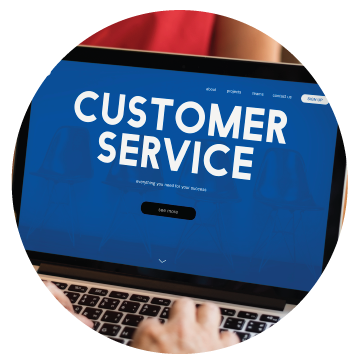“Customer Service is not a department. It is an Attitude.”
Multiple research reports show that customers were willing to spend more with a company that they felt provided an outstanding customer experience and excellence in customer service. Learning more about the skills, attributes and knowledge required to become customer service professionals is only one part of your development journey. This effort will only pay dividends when you also develop your genuine ‘be of service’ attitude. Excellence in customer service is actually 80% attitude and 20% skills and knowledge. The right attitude provides you with the approach you need to use your skills and knowledge to your full potential.
Further develop your ‘be of service’ attitude by applying the following strategies to customer interactions:
Have Confidence
Projecting confidence gives the impression that you are able and willing to help a customer. Confidence comes from ‘knowing your stuff’ and believing you will be able to tackle any challenge that comes your way. For customers, competence is a signal that lets them know that the person they’re working with has the requisite skills and abilities to complete their transaction or resolve their issue.
Think Positively
Our thought process and how we choose to think is reflected in our attitude. Every situation or moment has dual ways to look at it. It is up to you to choose how you would like to react to the particular scenario. Even if the situation is challenging and taking a toll on your patience, you will have to try and find out the tiniest positive aspect present in it. Setting the tone for a positive interaction can help to guide the way to a successful customer experience that will result in a favorable outcome for your customer.
Keep an Open mind
Being open-minded typically makes us more adaptable to a unique work environment or a challenging situation. It gives us the ability to consider alternative approaches to problem solving, to take risks and look for opportunities. Taking the time to consider all possible outcomes of a situation, the good, bad and in-between allows us to reframe the situation and think about it with an open mind resulting in a positive solution for the customer.
Take Ownership
Bring an ‘above the line’ attitude to all of your customer interactions. This approach means taking personal responsibility and ownership, being proactive and solution focused. Consider the difference between a customer service representative who takes no responsibility and one who acknowledges the concern and communicates a willingness to find a solution. We all know which person we would rather deal with and we also know which interaction will enhance the customer experience.
Remember, attitude is everything and whether your attitude is good or bad, it is this attitude that people are going to remember more than anything else. The good news is that you control what attitude your customers will remember. With a genuine ‘be of service’ attitude you are able to make full use of your skills, knowledge and attributes to meet the needs, wants and expectations of each one of your customers.
Can you can implement some of these strategies to develop the right attitude for business success and a ‘Be of Service’ attitude in the workplace?




